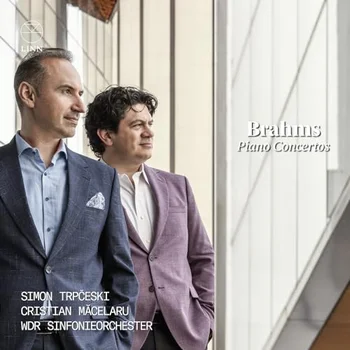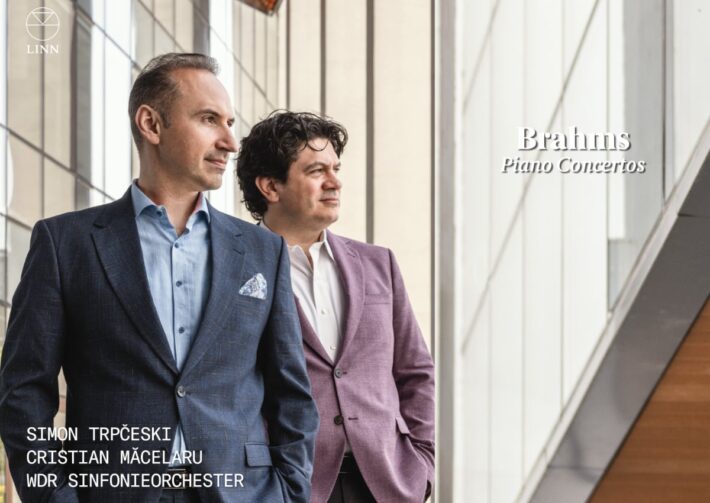Christian Măcelaru and the WDR Sinfonieorchester’s new album of the two Brahms piano concerti with pianist Simon Trpčeski is a decidedly different turn from their previous feature of Bartók’s Wooden Prince and Dance Suite. Of course, these stalwarts of the concerto repertoire invite plenty of comparison, including performances from the late Lars Vogt (conducted from the keyboard) and a period performance from András Schiff and the Orchestra of the Age of Enlightenment that made our Top 10 in 2021.

The introduction of the D minor concerto is what should establish the Maestoso character indicated in the tempo marking; while WDR makes clear the layering of sounds in Brahms’ orchestration, Măcelaru’s interpretation feels light handed and matter-of-fact. The most conspicuous issue is the timpani; it’s there physically but its presence is largely (and disappointingly) diminished, especially in the ominous rolls that are integral to establishing the right mood. In other parts of the introduction, it sounds like a mechanical ticking device. But make it to the last bars of the finale, and you’ll hear the timpani take over the sound stage. Also absent is the deliberate phrasing and urgency which Riccardo Chailly/Nelson Freire has or the symphonic heft the Berlin Philharmonic delivers in Sir Simon Rattle/Kristian Zimerman’s reading. I was hoping that Trpčeski’s entrance would help shift course but he seems to play right into the blandness. The sound quality is often pleasing, but the character isn’t quite right; combine that with over-pedaling and things get atmospheric rather than heady. The peak of my frustration hit in moments like 10’39”, whose octaves are far too polite: the downward cascade should pick up momentum, sound, and substance but instead flatlines (listen to the Schiff on this one — even without a more powerful modern instrument, the passage roars to life).
The pacing of the Adagio (track 2) is a tad fast but reasonable enough to maintain the integrity of the sostenuto melody. But once again, as in the previous movement, the spirit just isn’t there. I don’t at all want to fault the WDR players as there is a level of lyricism to enjoy, but Brahms‘ transcendent melodies require much more in terms of profundity and expansiveness. Trpčeski, too, maintains his gentle approach, though it fortuitously works in this movement. His playing offers moments of introspection, and I also liked how I could hear the intricate threads of the counterpoint—something that reminds me of the intricacies of Op. 116-119 late character pieces. But when all is said and done, I still find Karl Böhm/Maurizio Pollini’s rendition more moving.
The Finale (track 3) is probably the best, especially with the clarity and space that Trpčeski gives to the staccato notes, resulting in pristine passagework. As for the orchestra, it finally delivers the needed drive in the jubilant D major section but…did we really have to wait until the end of a nearly 45-minute piece for this gratification? Surely that could not have been the conductor’s intent.
The B-flat major concerto offers plenty more promise with the clearly enunciated French horn solo that dovetails nicely with Trpčeski’s lines. I noticed almost immediately the vigor that had been so wanting in the D minor; the noble orchestral interlude at 1’40”, for instance, has buoyant energy as does the pianist’s empathic chords beginning at 3’39”. The second movement dips back into old habits, with more insistence and push needed from the soloist’s melodies especially where the longer notes are concerned. When the orchestra takes over the theme in the later moments of the movement though, we get a better sense of the zest Brahms had perhaps intended.
The cello solo that opens the slow movement is very nice indeed: plenty of vibrato helps it sing beautifully and the expressive shifts in color are to be appreciated. Likewise, Trpčeski’s responsiveness to tonal movement is effective, as we hear in the middle B-flat minor section that is stormy and impassioned. The gracefulness of the final Allegretto Grazioso comes through in the dainty two note phrases, though I felt a little more playfulness in certain moments would make for a more enlivening listen.
These works are no walk in the park for either soloist or orchestra, and I really do wish I had more good things to say particularly about the D minor. I was also quite puzzled about the inconsistency of interpretations across the two concerti but the B-flat on the whole reminds us of the fine playing that the performers are capable of. All things considered, though, I wouldn’t say this album changes any of my primary recommendations as preferred listening points.
Recommended Comparisons
Pollini & Böhm | Freire & Chailly | Zimerman & Rattle | Gilels | Hough & Wigglesworth | Schiff
Brahms – Piano Concertos
Simon Trpčeski – Piano
WDR Sinfonieorchester
Christian Măcelaru – Conductor
Linn Records, CKD732



















